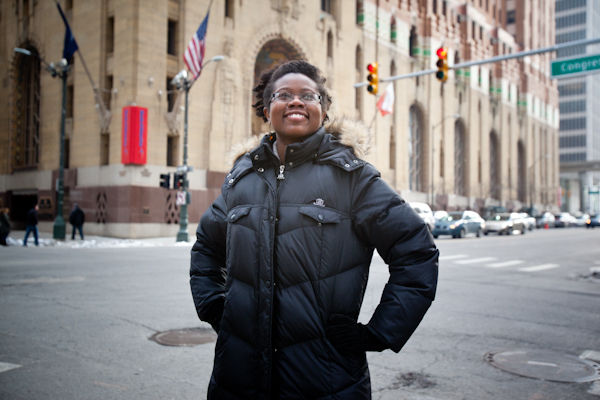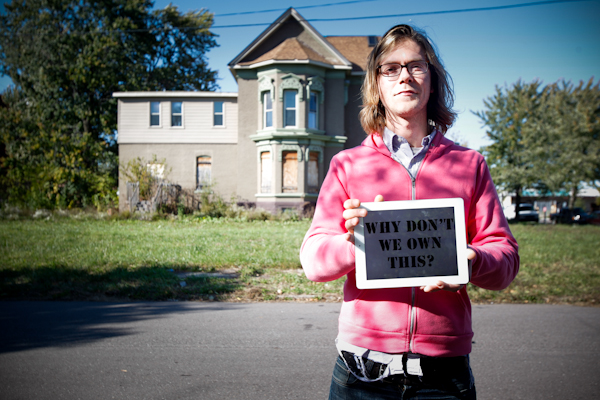From vacant to vibrant: A coalition rises
Educating community activists about the resources and best practices available for improving the quality of life in Detroit neighborhoods is the mission of the Vacant Property Coalition. Jon Zemke talks local empowerment with the group's Janai Gilmore.
Vacant property underlines some of Detroit’s biggest challenges and opportunities. Think of some of the Motor City’s worst stereotypes like the Michigan Central Station or abandoned houses and vacancy is principal reason behind it. At the same time, some of the city’s brightest highlights like Slows and new homeowners buying $500 houses revolve around Detroiters investing in that vacancy.
The Vacant Property Coalition is working to accelerate those sorts of transformations. The offshoot of the Michigan Community Resources, a downtown Detroit-based nonprofit, focuses on providing tools and a platform for grass-roots groups to tackle vacant properties and help people invest in them. Sometimes that is helping locals tap into grants to board up problem properties. Other times its enabling them to connect and speak with one voice to reform urban policy. The constant is there is no lack of work, opportunity and Detroiters looking to seize it.
“There are people who are on the ground doing things and taking inspiring action,” says Janai Gilmore, education & outreach program associate with Michigan Community Resources.
Target-rich environment
Gilmore is a Detroit native, growing up on the city’s East Side and graduating from Martin Luther King Jr. Senior High School and then Wayne State University in 2009. She also served a year with Wayne State’s Americorps Urban Safety Project. The 20-something’s urban experience goes beyond the Motor City after spending a year studying the challenges and opportunities faced by post-industrial cities in Germany through a fellowship from the German Academic Exchange Service.
Gilmore joined Michigan Community Research’s as an intern early last year and became a full-time staffer by summer. She now quarterbacks the Vacant Property Coalition, helping guide its evolution to tackle the constantly evolving problem of property vacancy in Detroit.
Before the Vacant Property Coalition there was the Boarding Coalition, which focused on helping local groups, such as block clubs, board up blighted buildings. The focus broadened when the vacancy problem grew in recent years thanks to economic headwinds like the foreclosure crisis, the great recession and mounting tax foreclosures.
Now the Vacant Property Coalition does everything from tracking vacant property to empowering local residents to turn problem properties into opportunities for investment and innovation. Its SAFE Minigrant program (SAFE is short for Security Alternative Funding & Empowerment) provides grants worth a few hundred to a few thousand dollars to block clubs or churches or other community groups. The mini-grants buy plywood for building board-ups or lawn mowers that tame the urban prairie or a number of other costly little things that help raise the quality of life in Detroit neighborhoods.
“Groups would like more programs like that because many of them are working out of pocket instead of watching the houses deteriorate before them,” Gilmore says. “Many of those groups say they need more funding so they can buy supplies, like gas for lawnmowers.”
The Vacant Property Coalition, and Michigan Community Resources in general, helps discretely educate local community activists about the resources available to them and best practices for improving the quality of life. It also connects these community activists with resources like pro-bono legal and technical expertise and provides a platform to speak with one voice to public officials about potential reforms and how to communicate more effectively. This year the Vacant Property Coalition is working to advocate for better code enforcement of blighted property.
“Owners too often feel they do not need to bear responsibility for their properties,” Gilmore says. “There is a lack of a financial incentive for them to take responsibility for their properties. They observe that they aren’t being held accountable on the enforcement side.”
Partnerships in LOVELAND
Perhaps the most comprehensive example of Detroit’s vacancy challenges can be found in its tax-foreclosed properties. Counties in Michigan seize and auction off property after its owners fail to pay property taxes after three years. Tax foreclosure normally is limited to a small fraction of properties in a municipality. That occurrence has snowballed in Detroit in recent years.
In 2011, Wayne County auctioned off more than 10,000 tax foreclosed properties, a vast majority of which were in Detroit. Thousands went unsold. Last year that number doubled to 22,000 properties. More than 90 percent of them were in Detroit and about 8,000 of those failed to generate the minimum bid of $500. This year, 43,000 properties (about 10 percent of the property in the city) are at risk of going to auction. Again the lion’s share are in Detroit and it appears likely more than 10,000 will go unsold.
LOVELAND Technologies, a downtown-based software start-up, has mapped and tracked each Wayne County Tax Foreclosure Auction since 2011 through its website WhyDontWeOwnThis.com. The company’s founders want to make the labyrinth of information that is the tax auction more accessible to everyday people who want to take control of the abandoned home on their block. Today LOVELAND Technologies is working with the Vacant Property Coalition to help maximize the community impact on problem properties that are endanger of being acquired by speculators or not being sold at all. Far too often the tax foreclosure’s unsold inventory ends up as the stereotypical blight the people behind the Vacant Property Coalition are working to eliminate.
“The foreclosure time bomb keeps ticking,” says Jerry Paffendorf, co-founder of LOVELAND Technologies. “It will mean huge swaths of city properties coming up for sale by law.”
LOVELAND Technologies not only provided the information technology that lets local activists take control of their community’s destiny but also helps bring in fresh blood. Many of the community activists that make up the Vacant Property Coalition are longtime residents. Think senior citizens and people not far from that stage in life. Many users of WhyDontWeOwnThis.com are young people looking to leverage the site’s technology to buy a house or a future home for their business.
Real world impact
If the Vacant Property Coalition succeeds at anything it’s helping stretch community funding to maximize impact.
Grandmont-Rosedale is a section of the city that comprises five neighborhoods, such as Rosedale Park and Grandmont. Those five neighborhoods each applied for a $5,000 SAFE minigrant that would help board up dangerous buildings or put solar-powered exterior lighting on houses going through foreclosure.
Three of those five neighborhoods won grants. The Vacant Property Coalition helped all five of those neighborhood groups come together to share those three grants through the Grandmont-Rosedale Development Corp. That way all five neighborhood groups got about $3,000 each to help abate their vacancy problems. It’s a local example of cooperation Gilmore and his colleagues at the Michigan Community Resources are trying to make happen across the entire city.
“It’s really going to take a coordinated approach across all sectors and industries in this city to tackle the vacant property issue,” says Shamyle Nesfield, director of education & outreach for Michigan Community Resources. “That’s just the bottom line, whether you’re talking about the city or the philanthropic community or the business community. They all need a common vision.”
Jon Zemke is Model D Startup News editor. This feature is in partnership with the Center for Community Progress, a national organization working to turn properties from vacant to vibrant.
Photos by Marvin Shaouni







